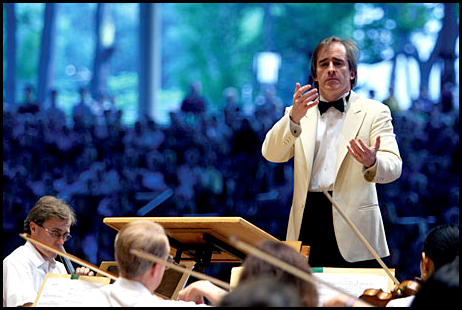August 11, 2011|John von Rhein | Classical music critic
“The Edge of the World” is essentially a piano concerto times five, which Muhly wrote for the young sibling pianists The 5 Browns, who were his classmates at the Juilliard School in the 1990s. The four movements, totaling about 18 minutes, form a series of nocturnes evoking geographical extremes and distances: the icy North, the rugged American West, old maps and the panorama of the night sky. The boyish-looking composer, 30, explained as much to Tuesday’s audience.
The Brown family pianists — Ryan, Melody, Gregory, Deondra and Desirae — have parlayed their keyboard prowess and youthful energy into a successful crossover career. Their gifts and Muhly’s came together nicely in “Edge of the World.” The composer has solved the problem of balancing 440 keys against a symphony orchestra by casting the orchestra in a supporting role; this consists mainly of sustaining a low rhythmic undercurrent and occasionally punctuating the pianists’ pounding dialogues with sharply accented chords.
Working within a jumpy, post-minimalist style, Muhly turns the five keyboards into a kind of hyper-piano: one or more pianists take the lead in interlocking patterns, the five functioning rather like members of a musical relay race. Much of the score is driven by percolating ostinatos that, in the second movement, give way to a folksy tune that could have been the main title of a 1950s Hollywood western.
Through it all, your ear is held by Muhly’s knack for creating imaginative textures and fields of sun-dappled colors that are constantly shifting in ways you don’t always expect. “The Edge of the World” was fun to hear. I was astonished by the precision with which the talented Browns executed their keyboard gymnastics, not to mention their crisp coordination with the CSO under James Conlon.. Casually dressed in jeans and sneakers, a beaming Muhly jumped up on stage to share in the applause.
The Browns vamped till the orchestra was ready with five-piano arrangements by Greg Anderson of three sections from Holst’s “The Planets” and Saint-Saens’ “Danse Macabre.” I’m not sure these bits added much to the program, beyond giving the pianists a chance to flex their digits before the main event. Only the militaristic rumbles of “Mars” (in the Holst suite) really worked in this guise; the other pieces lost in the translation.
Conlon concluded his final CSO concert of the season with Shostakovich’s Fifth Symphony — “the end of our Russian blast of the summer,” as he told the audience.
This durable Soviet symphony was a holdover from the CSO’s winter season, during which Riccardo Muti’s scheduled series of subscription performances was cut short following his nasty tumble from the podium. The subscribers got one chance to hear it under Muti before he and the CSO took it to Carnegie Hall in April.
Shostakovich’s most popular symphony, a so-called “Soviet artist’s reply to just criticism,” redeemed him in the eyes of the Politburo in the wake of his previous modernist transgressions. Some performers, armed with the hindsight afforded them by “Testimony,” Solomon Volkov’s controversial 1979 book of Shostakovich “memoirs,” regard the work as coded political subversion. Conlon would appear to be among their number, as his spoken introduction indicated.
Despite this, his full-blooded performance gave no overt indication he has joined the revisionist school. There was power aplenty, as only a great orchestra can deliver, albeit the fine instrumental detail Muti pulled from the score failed to come across as vividly in the not so great outdoors.
Conlon worked the orchestra to a veritable boil in the development of the first movement, and his scherzo carried the right brusque sarcasm. Shostakovich made the Largo the expressive soul of his symphony, and Tuesday’s reading rose to a searing climax, set off by Eugene Izotov’s plaintive oboe solo. Conlon’s fast, furious finale felt traditional in its affirmative tone, taking as it did the music’s public-square triumphalism at face value.
Twitter @johnvonrhein

No comments